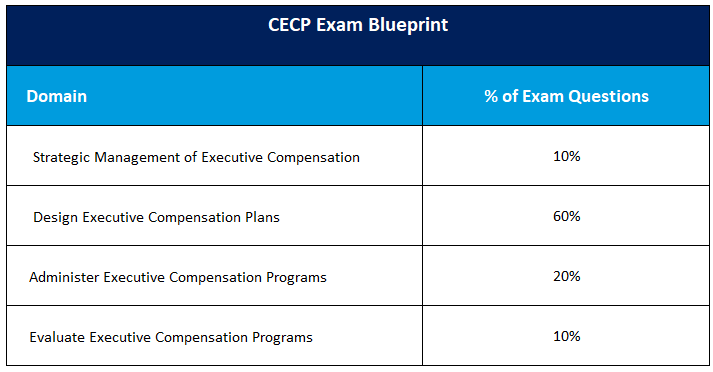Candidates preparing for the Certified Executive Compensation Professional (CECP®) examination should review the Body of Knowledge (BOK). The BOK represents the complete set of knowledge and skills required for professionals working in the executive compensation field. Set as the industry standard, this BOK was recently validated and revised by WorldatWork via a formal practice analysis completed by hundreds of practitioners. The new CECP® examination covers all topic areas addressed in this Body of Knowledge.
The Body of Knowledge is comprised of four main knowledge domains consisting of 78 total tasks representing common skills, knowledge and abilities of the executive compensation professional. You should review the BOK while performing a self-assessment of your individual strengths and weaknesses of the subject matter to be tested. You should review all topic areas with deeper concentration on those in which you have identified as areas of weakness.

Strategic Management of Executive Compensation
- Understand the mission, vision, and business strategy of the organization.
- Ensure alignment of executive compensation with business strategy and financial goals.
- Develop the executive compensation pay philosophy.
- Identify objectives for executive compensation programs.
- Understand the employee value proposition (EVP).
- Understand the governance structure of the organization.
- Recognize internal and external influences on executive compensation.
- Identify stakeholder interests and concerns.
- Track competitor and broader industry trends and practices.
- Understanding how to navigate the relationship with the compensation committee and their consultants.
- Develop shareholder engagement strategy.
Design Executive Compensation Plans
- Understand executive compensation benchmarking processes.
- Identify competitive market for executive talent.
- Analyze and interpret survey data.
- Analyze and interpret publicly disclosed compensation data (e.g., proxy statement, Form 10-K, etc.).
- Understand roles and responsibilities of executive positions.
- Establish target competitive market position for executive roles.
- Understand short-term incentive design elements.
- Understand long-term incentive design elements.
- Understand regulatory requirements and best practices for executive compensation.
- Understand how to apply regression analysis.
- Understand stock-based vehicles used to compensate executives .
- Understand stock award valuation methods.
- Understand supplemental executive benefits (e.g., deferred compensation).
- Determine the appropriate short-term incentive (STI) approach for the company circumstances.
- Determine the appropriate long-term incentive (LTI) approach for the company circumstances.
- Determine appropriate pay mix for compensation.
- Develop guidelines for executive recognition and retention awards.
- Make recommendations for changes to executive benefits (e.g., health, retirement).
- Make recommendations for changes to executive perquisites.
- Establish performance measures for all incentive plans.
- Design/develop stock ownership guidelines and share retention requirements.
- Assess pay equity of executive compensation.
- Assist in assuring the legal compliance of all plan designs.
- Develop market competitive director compensation programs.
- Consult with external and internal stakeholders on executive compensation plan design.
- Understand all executive reward elements.
- Interpret and appropriately utilize employment contracts and agreements.
- Understand and administer severance and change-in-control agreements and provisions.
- Understand and apply the relationship between financial statements and incentive programs.
- Understand tax and accounting principles for executive compensation.
- Create and deliver effective and succinct presentations on executive compensation proposals and trends.
- Identify and follow appropriate plan approval processes.
- Prepare executive job position descriptions.
Administer Executive Compensation Programs
- Administer base pay program for executives.
- Administer ad-hoc cash payment for executives.
- Administer short-term incentive programs for executives.
- Administer long-term incentive programs for executives.
- Administer benefits for executives.
- Administer supplemental benefits for executives.
- Administer deferred compensation programs for executives.
- Administer perquisites for executives.
- Provide information and counseling to executives on benefits and perquisites.
- Make pay changes as needed for internal executive staffing moves.
- Administer pay for external executive new hires.
- Interact with/support the compensation committee of the Board of Directors on executive compensation program administration.
- Provide analytical tools (and education) for use by the compensation committee to assess change in executive compensation programs (e.g., tally sheets, etc.).
- Identify when you need to engage with other committees of the Board of Directors.
- Develop all executive rewards-related materials and reports for director meetings as required.
- Effective coordination between management and executive compensation consultants.
- Manage service provider relationship with stock plan administrator.
- Manage relationships with executive rewards service providers.
- Collaborate with key internal stakeholders (Finance, Accounting, Legal and Investor Relations).
- Manage the collection of performance and financial results to support the official review and determination process on final reward payouts.
- Communicate with executives regarding rewards programs including the specifics of their individual total rewards packages (e.g., prepare communication materials).
- Administer executive compensation programs in accordance with all relevant accounting and tax requirements.
- Assist in the completion of all proxy disclosure requirements (Compensation Discussion and Analysis [CD&A], tabular disclosures, other).
- Prepare documents as required for shareholder meetings (e.g. annual meeting, major shareholder engagement meetings, investor call, etc.).
- Assist in the completion of public disclosure requirements for executive compensation.
Evaluate Executive Compensation Programs
- Use statistical tools and processes to evaluate incentive plan performance.
- Develop objectives to determine the success of various executive compensation plan designs.
- Obtain qualitative and quantitative data on plan performance.
- Evaluate executive compensation plan performance against objectives.
- Evaluate the performance of executive compensation service providers.
- Evaluate internal equity and external competitiveness of executive compensation programs.
- Audit executive compensation programs to ensure legal compliance.
- Identify and document unintended outcomes of executive compensation plans.
- Identify and implement improvements to executive compensation plans.

"Whether you’re an early career person or a senior leader in the compensation and total rewards field like myself, there really is something for everyone."

“WorldatWork is a great organization to help you help yourself advance your career.”

“I decided to join WorldatWork because of the opportunity for knowledge-based improvement as well as the path to certification in my field.”
Terrence Campbell, Senior Project Manager of Compensation and Commissions, Elekta
